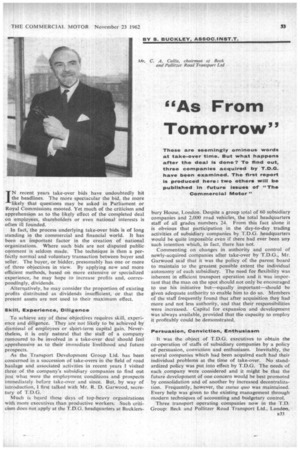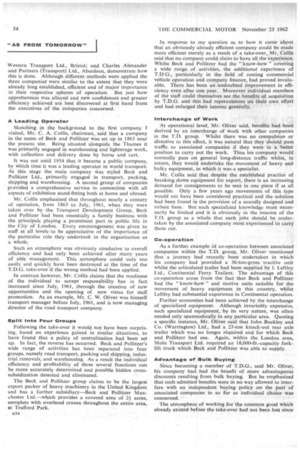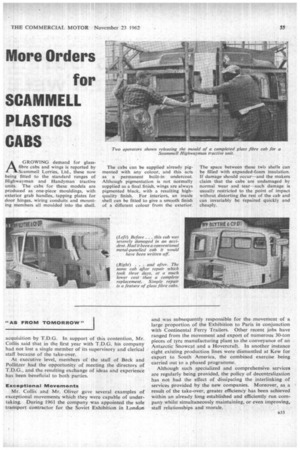"As From Tomorrow"
Page 55

Page 56

Page 57

If you've noticed an error in this article please click here to report it so we can fix it.
IN recent years take-over bids have undoubtedly hit the headlines. The more spectacular the bid, the more likely that questions may be asked in Parliament or Royal Commissions mooted. Yet much of the criticism and apprehension as to the likely effect of the completed deal on employees, shareholders or even national interests is often ill founded.
In fact, the process underlying take-over bids is of long standing in the commercial and financial world. It has been an important factor in the creation of national organizations. Where such bids are not disputed public comment is seldom made. The technique is then a perfectly normal and voluntary transaction between buyer and seller. The buyer, or bidder, presumably has one or more of three objectives in view. By applying new and more efficient methods, based on more extensive or specialized experience, he may hope to increase profits and, correspondingly, dividends.
Alternatively, he may consider the proportion of existing profits distributed as dividends insufficient, or that the present assets are not used to their maximum effect.
Skill, Experience, Diligence
To achieve any of these objectives requires skill, experience and diligence. They are not likely to be achieved by dismissal of employees or short-term capital gain. Nevertheless, it is only natural that the staff of a company rumoured to be involved in a take-over deal should feel apprehensive as to their immediate livelihood and future prospects.
As the Transport Development Group Ltd. has been concerned in a succession of take-overs in the field of road haulage and associated activities in recent years I visited three of the company's subsidiary companies to find out just what were the employment conditions and prospects immediately before take-over and since. But, by way of introduction, I first talked with Mr. R. D. Garwood, secretary of T.D.G.
Much is heard these days of top-heavy organizations with more executives than productive workers. Such criticism does not apply at the T.D.G. headquarters at Bucklers
bury House, London. Despite a group total of 60 subsidiary companies and 2,000 road vehicles, the total headquarters staff of all grades numbers 24. From this fact alone it is obvious that participation in the day-to-day trading activities of subsidiary companies by T.D.G. headquarters would be quite impossible even if there had ever been any such intention which, in fact, there has not.
Commenting on changes in authority and control of newly-acquired companies after take-over by T.D.G., Mr. Garwood said that it was the policy of the parent board to maintain to the greatest possible extent the individual autonomy of each subsidiary. The need for flexibility was inherent in efficient transport operation and it was important that the man on the spot should not only be encouraged to use his initiative but—equally important—should be given adequate authority to enable him to do so. Members of the staff frequently found that after acquisition they had more and not less authority, and that their responsibilities were increased. Capital for expansion and development was always available, provided that the capacity to employ it profitably could be demonstrated,
Persuasion, Conviction, Enthusiasm
It was the object of T.D.G. executives to obtain the co-operation of staffs of subsidiary companies by a policy of persuasion, conviction and enthusiasm. Inevitably, the several companies which had been acquired each had their individual problems at the time of take-over. No standardized policy was put into effect by T.D.G. The needs of each company were considered and it might be that the future development of one concern would be best promoted by consolidation and of another by increased decentralization. Frequently, however, the status quo was maintained. Every help was given to the existing management through modern techniques of accounting and budgetary control.
Three transport operating companies now in the T.D. Group: Beck and Pollitzer Road Transport Ltd., London, Western Transport Ltd., Bristol; and Charles Alexander and Partners (Transport) Ltd., Aberdeen, demonstrate how this is done. Although different methods were applied the three companieS were similar to the extent that they were already long established, efficient and of major importance in their respective spheres of operation. But just how apprehension was allayed and new confidences and greater efficiency achieved are best discovered at first hand from the executives of the companies concerned.
A Leading Operator Sketching in the background to the first company I visited, Mr. C. A. Collis, chairman, said that a company in the name of Beck and Pollitzer was set up in 1863 near the present site. Being situated alongside the Thames it was primarily engaged in warehousing and lighterage work, with collection and delivery done by horse and cart.
It was not until 1954 that it became a public company, by which time it was a leading operator in world transport. At this stage the main company iVas styled Beck and Pollitzer Ltd., primarily engaged in transport, packing, shipping and warehousing. A second group of companies pi ovided a comprehensive service in connection with all aspects of exhibition stand-fitting both at home and abroad.
Mr. Collis emphasized that throughout nearly a century of operation, from 1863 to July, 1961, when they were taken over by the Transport Development Group, Beck and Pollitzer had been essentially a family business with the principals playing a prominent part in public life in the City of London. Every encouragement was given to staff at all levels! to be appreciative of the importance of the particular role they undertook in the organization as a whole.
Such an atmosphere was obviously conducive to overall efficiency and had only been achieved after many years of able management. This atmosphere could only too easily and quickly have been destroyed at the time of the T.D.G. take-over if the wrong method had been applied.
In contrast however, Mr. Collis claims that the readiness of the individual to accept responsibility has in fact increased since July, 1961, through the creation of new opportunities and the opening of new vistas for staff promotion. As an example, Mr. C. W. Oliver was himself transport manager before July, 1961, and is now managing director of the road transport company.
Split Into Four Groups Following the take-over it would not have been surprising, based on experience gained in similar situations, to have found that a policy of centralization had been set up. In fact, the reverse has occurred. Beck and Pollitzer's wide range of activities has been separated into four groups, namely road transport, packing and shipping, industrial removals, and warehousing. As a result the individual efficiency and profitability of these several functions can be more accurately determined and possible hidden crosssubsidization detected and eliminated.
The Beck and Pollitzer group claims to be the largest export packer of heavy machinery in the United Kingdom and has a further subsidiary—Beck and Pollitzer Manchester Ltd.—which provides a covered area of 21 acres, complete with overhead cranes throughout the entire area, at Trafford Park. In response to my question as to how it came about that an obviously already efficient company could be made more efficient merely as a result of a take-over, Mr. Collis said that no company could claim to have all the experience. Whilst Beck and Pollitzer had the " know-how " covering a wide range of activities, the additional experience of T.D G., particularly in the field of costing commercial vehicle operation and company finance, had proved invaluable. There has been an undoubted improvement in efficiency even after one year. Moreover individual members of the staff could themselves see the benefits of acquisition by T.D.G. and this had repercussions on their own effort and had enlarged their interest generally.
Interchange of Work
At operational level, Mr. Oliver said, benefits had been derived by an interchange of work with other companies in the T.D. group. Whilst there was no compulsion or directive to this effect, it was natural that they should pass traffic to associated companies if they were in a •better position to carry out the work. Thus his company would normally pass on general long-distance traffic whilst, in return, they would undertake the movement of heavy and bulky equipment, in which it was a specialist.
Mr. Collis said that despite the established practice of breaking down equipment for export, there is an increasing demand for consignments to be sent in one piece if at all possible. Only a few years ago movements of this type would not have been considered practical and the solution had been found in the provision of a soundly designed and robust base. But such specialized knowledge must necessarily be limited and it is obviously in the interest of the T.D. group as a whole that such jobs should be undertaken by the associated company most experienced to carry them out.
Co-operation As a further example Of co-operation between associated companies within the T.D. group, Mr. Oliver mentioned that a journey had recently been undertaken in which his company had 'provided a 36-ton-gross tractive unit whilst the articulated trailer had been supplied by I. Leftley Ltd., Continental Ferry Trailers. The advantage of this co-operation arose from the fact that Beck and Pollitzer had the " know-how " and motive units suitable for the movement of heavy equipment in this country, whilst Leftley had substantial experience in Continental operation, Further economies had been achieved by the interchange of specialized equipment. Although invariably expensive, such specialized equipment, by its very nature, was often needed only spasmodically in any particular area. Quoting a specific instance, Mr. Oliver said that John Buckley and Co. (Warrington) Ltd., had a 25-ton knock-out rear axle trailer which was no longer required and for which Beck and Pollitzer had use. Again, within the London area, Mob o Transport Ltd. required an 18,000-lb.-capacity forklift truck which peck and Pollitzer was able to supply.
Advantage of Bulk Buying Since becoming a member of T.D.G., said Mr. Oliver, his company had, had the benefit of more advantageous discounts resulting from bulk buying. But he emphasized that such admitted benefits were in no way allowed to interfere with an independent buying policy on the part of associated companies in so far as individual choice was concerned.
The atmosphere of working for the common good which already existed before the take-over had not been lost since acquisition by T.D.G. In support of this contention, Mr. Collis said that in the first year with T.D.G. his company had not lost a single member of its supervisory and clerical staff because of the take-over.
At executive level, members of the staff of Beck and Pollitzer had the opportunity of meeting the directors of T.D.G., and the resulting exchange of ideas and experience has been beneficial to both parties.
Exceptional Movements
Mr. Collis and Mr. Oliver gave several examples of exceptional movements which they were capable of undertaking. During 1961 the company was appointed the sole transport contractor for the Soviet Exhibition in London and was subsequently responsible for the movement of a large proportion of the Exhibition to Paris in conjunction with Continental Ferry Trailers. Other recent jobs have ranged from the movement and export of numerous 30-ton pieces of tyre manufacturing plant to the conveyance of an Antarctic Snowcat and a Hovercraft. In another instance eight existing production lines were dismantled at Kew for export to South America, the combined exercise being carried out to a phased programme.
Although such specialized and comprehensive services are regularly being provided, the policy of decentralization has not had the effect of dissipating the interlinking of services provided by the new companies. Moreover, as a result of the take-over, greater efficienCy has been achieved within an already long established and efficiently run company whilst simultaneously maintaining, or even improving, staff relationships and morale.








































































































